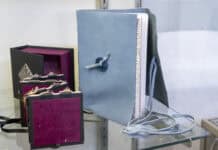
The Sedona City Council voted unanimously on Jan. 14 to award consulting firm Kimley-Horn a $1,872,014 contract to design the city’s proposed bus maintenance facility adjacent to the wastewater plant outside of town as part of a “cost-blind” decision process.
Procurement officer Ian Coubrough explained to council that city staff were not allowed to consider cost proposals as part of the contract award process as a result of compliance with federal and state regulations “because we did receive federal funds for this project.”
“In Arizona Revised Statutes, it does prohibit an agent or the selection committee from requesting or considering fees, price, hours or anything like that during the selection process,” Coubrough said. “The history of that is the federal government adopted back in the ’70s a qualifications-based selection process for architects and engineers, that was known as the Brooks Act of 1972, and that kind of continued its momentum into state law. I think 46 states in the country have adopted that methodology, and that is how typically architecture and engineering services are procured.”
“One other interesting restriction, potentially, to this process, is that if the city starts negotiations on a price proposal with a finalist, and we terminate those negotiations, there’s no ability for the city to then go back to that finalist,” Coubrough added. “That is also specified in the Arizona Revised Statutes.”
“You couldn’t play one against the other,” Vice Mayor Holli Ploog said.
The city received initial inquiries from 34 firms following the issuance of the request for proposals but only four submitted a final proposal, among which Kimley-Horn’s proposal received the highest score.
Following completion of the submission process and Kimley-Horn’s selection, Kimley-Horn proposed a design fee of $2,272,133, which was later reduced to $1,872,014 during negotiations. The Federal Transit Administration grant to which Coubrough referred will provide the city with $720,000 toward the design costs.
The contract covers only the design of the bus barn; the city’s fiscal year 2025 budget estimated the total cost of the project to be $25,356,576.
“How stringent is our contract?” Ploog asked. “We’re always looking at additional awards, change orders, things like that. All these contracts, they go up and up and up and up. How tight is the contract so we avoid this ongoing addition of change orders? If they bid $2.2 [million], are they expecting to make up the $400,000 in change orders during the term of the contract?”
“Change orders and amendments to contracts happen,” Coubrough said, but added, “I don’t see any issues arising from it.”
“We’ll remember that,” Ploog said.
Kimley-Horn’s proposed schedule included with its submittal projected that the design process will take 17 months, which would allow construction to begin in June 2026. City staff originally planned for the contract to be awarded in September 2024.
“If you could align the stars and the moon, could you collapse this somehow from 17 months down to 12 or down to 8?” Councilman Brian Fultz asked. “If we were really on a hurry on something — ever — could we collapse one of these schedules?”
“Yes, you can,” Director of Public Works Kurt Harris said. “It usually costs a higher price.”
Nena Barlow of Barlow Adventures was the only member of the public to speak on the proposal, and asked the council to consider improved highway crossing access for off-highway vehicles as part of the planned redesign of the State Route 89A intersection at the wastewater plant during the design process, possibly incorporating a roundabout.
The council then approved the contract unanimously.




















